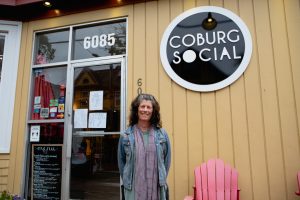
Long-time co-owner of Coburg Social, Kelly Irvine, is leading a fight she says is a matter of survival for her business.
On June 19, Irvine filed a petition to District 7 Councillor, Waye Mason. The petition received 1,200 signatures in support of letting the café expand its patio space. The addition would offer 20 extra seats but requires a portion of Henry Street to be closed off. Mason brought the petition to council and it was later denied.
Having the chance to temporarily expand their café doesn’t guarantee they’ll make more money but she knows it will let her increase her customer capacity, from 50 to 70 per cent.
“The city doesn’t have tourists, Dal doesn’t have students, Dal doesn’t have conferences, so we’re fighting against a whole bunch of battles but at least if we had the seats for people to sit in, we’d have a chance at increasing our sales,” says Irvine.
Before the lockdown, Coburg Social employed a staff of twenty-five. During the pandemic, Irvine had to lay everyone off. Relying on her four children while scraping by on 20 per cent of their regular sales, together her family was able to run orders at the front window, as well as online and by phone.
Since the café opened dine in service on June 9, Irvine rehired 12 of her 25 workers using the wage subsidy. Coburg Social has also qualified for the $40,000 Canada Emergency Business Account loan (CEBA). When asked how long she plans to use it, Irvine laughs and says, “as long as we possibly can.”
Professor and Business Analyst, Ed McHugh says the small business sector has been hit hard. “My heart bleeds for small businesses right now. For a lot of small businesses, it’s not about succeeding right now: it’s about surviving.” McHugh says big businesses can absorb shocks far better than small businesses can. Small business owners are dealing with something they never anticipated, because of it, their livelihoods are in jeopardy.
Currently serving 400 regulars on a busy day, this is a fraction of the 1000 customers she’d serve before COVID-19. McHugh says in order for small businesses like the Coburg Social to recover, owners can’t be afraid to raise prices, lay off staff, and try unconventional ways to promote themselves. For Irvine, her patio proposal would do that.

According to Mason, the current plan Irvine has submitted doesn’t meet the city’s expectations. He says the café needs to provide an improved plan that accounts for wheelchair accessibility, at both ends of the patio. Irvine has also requested to install pavers where it’s currently grass. Mason says that request has been denied and will remain that way.
“We’re encouraging businesses to get rid of parking on the street and make that into a patio, put a couple barricades at the beginning and end of the patio area. Closing a street is a whole other process that requires a public hearing, and a whole bunch of time, even if it’s temporary,” says Mason.
Irvine says she doesn’t feel like her voice is being heard by the city. “We’re trying to ask the city to think outside of the box, we’re in the middle of a pandemic, maybe relax some rules, maybe let things happen in a different way than they have before.” Irvine plans on submitting an improved plan. If that isn’t approved, she says Coburg Social will continue to fight onward — at 50 per cent capacity — until they can’t anymore.
As Irvine and her staff continue to adapt, the challenges they face have left hope running thin. “I think everyone’s done what they can do in the midst of a pandemic. At this point the only thing we can hope for is a vaccine. I don’t see any other answers.”
